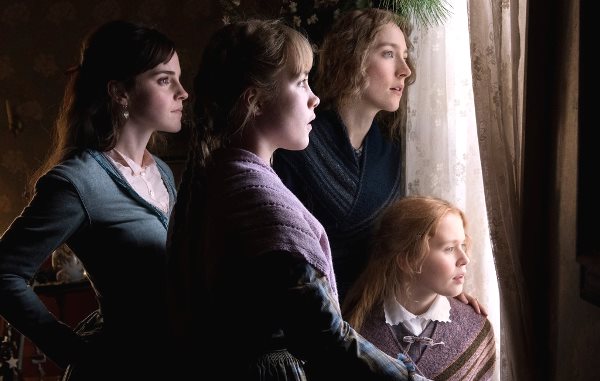
The March sisters are back, and Greta Gerwig’s got ‘em.
But do moviegoers need another movie of Louisa May Alcott’s family saga, when there seems to be an adaptation every few decades, if not sooner? In 2018, a PBS and BBC co-production debuted on Masterpiece, starring a largely British cast with Emily Watson as a maternal Marmee and the luxury casting of live wire Angela Lansbury as Aunt March. It was literally by the book, with few deviations or surprises.
There are, of course, two versions from the Hollywood studio system. George Cukor’s fleet-footed 1933 was a showcase for the up-and-coming Katharine Hepburn as Jo March, and Hepburn is still the standard bearer for the role. (Perhaps it was a case of typecasting; it doesn’t hurt that an independent, headstrong Yankee was playing an independent, headstrong Yankee.) So far none of the other productions have been as overproduced as MGM’s all-star lineup from 1949, which featured a bizarrely blond Elizabeth Taylor as the vain and self-assured Amy.
It’s difficult not to compare Gerwig’s steady yet rambunctious version to Gillian Armstrong’s 1994 Winona Ryder star vehicle, since they share a similar faithfulness to the source material, though emphasizing different themes. (Its screenwriter, Robin Swicord, is a producer for this year’s model.) Gerwig’s most significant alteration in her retelling is the jagged time line.
As it begins, a grown-up Jo (Saorise Ronan, who never really loses her Irish accent) is pitching a story based on her family to a New York publisher. By beginning toward the novel’s end and continuously going back into time seven years earlier—during the Civil War—the story line traces back to the formation of the March sisters’ destinies as they grow up in Concord, Massachusetts: Jo, Meg (Emma Watson), Amy (Florence Pugh), and Beth (Eliza Scanlen). Guiding the time jumps is the often lush and jaunty musical score by Alexandre Desplat. He’s given assistance by Chopin, whose Nocturne No. 5 in F Sharp Major is given quite a work out.
Perhaps more so than the other adaptations, Gerwig’s script emphasizes the transitions in the lives for all four sisters, as well as their making deliberate choices of their own volition. However, it downplays one of Alcott’s themes, the inevitability of change, which serves as the central conflict in Mark Adamo’s 2000 operatic opus, which has become one of the most produced American operas of the last 25 years. In doing so, Gerwig consciously tones down the sentimentality. Sure, bring Kleenex, but in terms of a tearjerker, her rendition ranks well below the 1933 release and the 1994 film, which featured Claire Danes as the frail Beth. The romantic happy ending also takes a few steps from the spotlight; the most important relationship consummated here is between Jo and her publisher (Tracy Letts) in the form of a book contract, with Jo on top, retaining the copyright to her work.
In directing her cast, Gerwig shifts between an enforced touch-feely intimacy and rowdiness, particularly the roughhousing between Jo and the wealthy boy next door, Laurie (Timothée Chalamet); pushing and hitting each other becomes their means of communication. The relationships within the household are also tactile; no emotionally repressed New Englanders are they. Yet the effect is frequently as though everyone is at a party intentionally faking intimacy, including the contemporary-looking Laura Dern as Marmee, who comes across as a calm, gracious hostess rather than as a mother trying to hold her family together while her husband is off at war. They are all rather nice to each other, even when a sister takes aim and criticizes or mocks another. (Of all the cast, only Meryl Streep, in full Edna May Oliver mode, goes full-on Victorian, a Whistler painting come snippily to life.)
Even when Jo burns Meg’s hair with a curling iron (see, the script leaves intact most of Alcott’s episodes), the siblings are on their best behavior, except for Amy; Pugh offers the movie’s most heartfelt, and volatile, performance—Amy always seems to have something on her mind, and her sisters appear wan in comparison, besides the sickly Beth. There’s more bitterness, and rivalry, between Jo and Amy than previously depicted on screen. For the first time ever, you might be afraid that this sisterhood can’t be saved.
Of all the movie versions, this is more of an ensemble piece and less driven by Jo; Amy is given more screen time than perhaps ever before. Ronan’s effortless ease and subtly from her lead roles in Gerwig’s Lady Bird and John Crowley’s Brooklyn have been deflated; she’s often constrained and mannered, more easy going than fearlessly independent, especially in Jo’s exchanges with Laurie. Amy practically becomes the main protagonist, as the coquette juggles one rich suitor and another while on a tour in Paris, while Pugh wins the MVP title among the cast. If Amy is your favorite March sister, then you’ll feel she has finally gotten her due.
















Leave A Comment